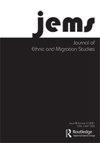Skilled US migrants in the Pearl River Delta region: the rise of an intellectual gateway in China
IF 2.8
1区 社会学
Q1 DEMOGRAPHY
引用次数: 3
Abstract
ABSTRACTThe increasing globalization and rising knowledge-based economy have created a higher-than-ever demand for skilled workers. China, among some Global South countries, is joining the race for talent to alleviate the brain drain. Using the conceptual framework of ‘intellectual migration’, this study examines how the Pearl River Delta (PRD) region of China is increasingly becoming an ‘intellectual gateway’ that attracts and retains skilled international migrants. Drawing on 58 semi-structured interviews with skilled US migrants in this region, this article addresses the following research questions: (1) Why do skilled US migrants choose the region as their migration destination; and (2) As a rising intellectual gateway, how does the PRD region shape the integration of skilled US migrants?Our findings suggest that the PRD region’s knowledge-based economy and socio-cultural environment serve as strong magnets that attract skilled US migrants. These factors are critical to the structural and socio-cultural integration of skilled international migrants. The research advances the intellectual migration framework by providing empirical evidence on the geography of intellectual migration in a fast-growing megalopolis in the Global South, demonstrating the diversity of intellectual migrants and intellectual gateways. Policy implications include supporting the synergy of structural and socio-cultural integration of global talent.KEYWORDS: Intellectual gatewayskilled migrationlocational choiceintegrationChina AcknowledgementA US National Science Foundation grant (BCS-1660526) partially funded the research project that this article is based upon. The opinions expressed are those of the authors and do not necessarily reflect the views of the funding agencies. We thank American Association of Geographer’s Dissertation Grant and Arizona State University’s Melvin G. Marcus Memorial Fellowship and Matthew G. Bailey Scholarship for supporting the fieldwork. We are thankful for the insightful comments from the anonymous reviewers. We thank Dr. Elizabeth Chacko for her feedback on an earlier draft of the manuscript. We also thank Mr. Siqiao Xie for introducing key literature to us. We appreciate all the participants for sharing their migration and life experiences.Disclosure statementNo potential conflict of interest was reported by the authors.珠三角地区的美国技术移民:中国智力门户的崛起
摘要随着全球化的发展和知识经济的兴起,对技术工人的需求比以往任何时候都高。中国和一些全球南方国家正在加入人才争夺战,以缓解人才流失。本研究利用“智力移民”的概念框架,探讨了中国珠江三角洲(PRD)地区如何日益成为吸引和留住技术移民的“智力门户”。通过对该地区58位美国技术移民的半结构化访谈,本文解决了以下研究问题:(1)为什么美国技术移民选择该地区作为他们的移民目的地;(2)作为新兴的知识门户,珠三角地区如何塑造美国技术移民的融合?我们的研究结果表明,珠三角地区的知识经济和社会文化环境是吸引美国技术移民的强大磁石。这些因素对于熟练国际移徙者的结构和社会文化融合至关重要。本研究通过对全球南方快速发展的特大城市的知识移民地理提供实证证据,展示了知识移民和知识门户的多样性,从而推进了知识移民框架。政策影响包括支持全球人才的结构和社会文化融合的协同作用。关键字:智力门户技术移民区位选择整合中国鸣谢人:美国国家科学基金项目(BCS-1660526)为本文所依据的研究项目提供部分资助。本文仅代表作者个人观点,并不一定反映资助机构的观点。我们感谢美国地理学家协会的论文资助和亚利桑那州立大学的Melvin G. Marcus纪念奖学金和Matthew G. Bailey奖学金对实地工作的支持。我们非常感谢来自匿名评论者的富有洞察力的评论。我们感谢Elizabeth Chacko博士对初稿的反馈。我们也感谢谢思乔先生为我们介绍的关键文献。我们感谢所有与会者分享他们的移民和生活经验。披露声明作者未报告潜在的利益冲突。
本文章由计算机程序翻译,如有差异,请以英文原文为准。
求助全文
约1分钟内获得全文
求助全文
来源期刊

Journal of Ethnic and Migration Studies
Multiple-
CiteScore
7.80
自引率
9.10%
发文量
157
期刊介绍:
The Journal of Ethnic and Migration Studies (JEMS) publishes the results of first-class research on all forms of migration and its consequences, together with articles on ethnic conflict, discrimination, racism, nationalism, citizenship and policies of integration. Contributions to the journal, which are all fully refereed, are especially welcome when they are the result of original empirical research that makes a clear contribution to the field of migration JEMS has a long-standing interest in informed policy debate and contributions are welcomed which seek to develop the implications of research for policy innovation, or which evaluate the results of previous initiatives. The journal is also interested in publishing the results of theoretical work.
 求助内容:
求助内容: 应助结果提醒方式:
应助结果提醒方式:


